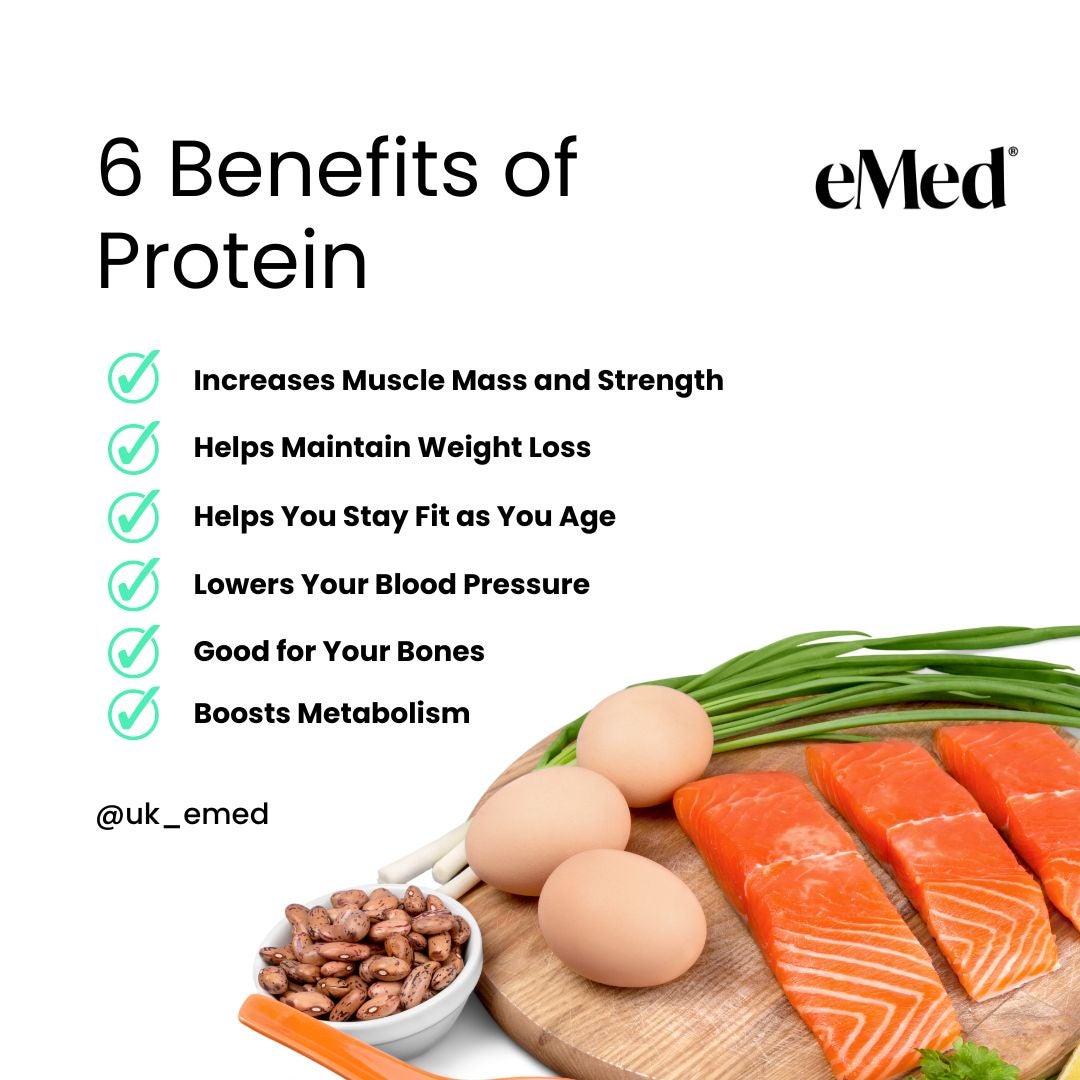You only have to open Instagram and explore fitness pages to realise protein plays a key role in maintaining a healthy body, with a particular popularity in weight loss diets. Gym lovers will often post their high protein meals, and a number of fad diets focus on enhancing your protein intake. But is it really all it’s cracked up to be and do you really need to increase your protein intake?
What is the role of protein?
Protein serves as the fundamental building block for tissues, enzymes, hormones, and antibodies, crucial for growth, repair, and various physiological functions in the body.
Protein is also an important player in weight loss due to the following mechanisms:
- Increasing metabolic rate: Protein requires more energy to be digested than fats and carbohydrates, meaning you use more calories to break it down which supports weight loss.
- Promoting fullness: As protein takes longer to digest, it leaves you feeling satiated for longer, reducing snacking and extra food intake.
- Preserving lean muscle mass: Weight loss causes both fat and muscle loss. However, adequate protein intake means muscle will be protected and fat stores will be used up instead.
- Supports muscle growth and repair: Engaging in physical activity is an important aspect of weight loss. Eating enough protein repairs damage to your muscle and causes your metabolism to increase due to increased muscle mass.
How much protein do I need?
The recommended daily intake of protein is between 0.8-1.2g/kg. That equates to anywhere between 10-35% of your total calorie intake, but this is a recommendation and will vary depending on your activity levels, age, and other factors!
Some studies have shown that higher protein diets, between 1.2-1.8g/kg of protein a day with 20-30g protein per meal have weight loss benefits. However, other long term studies have shown that whilst high protein diets cause greater weight loss within the first 3-6 months, these significant differences fade after 12-24 months.
Knowing that you should aim for 20-30g of protein per meal is great, but what does that actually look like? As a quick example, 200g of low fat yogurt, 75g of chiocken or 3 large eggs would provide you with 20g of protein.
How can I include more protein in my diet?
By following a well-balanced diet that is rich in whole grain carbohydrates, unsaturated fats and good quality protein sources will get you well on your way to achieving your required level of protein. If you find you are struggling to meet your protein requirements, a straightforward method to increase your protein intake is to incorporate protein powders into your diet. They are convenient and quick to prepare, especially for post-workout recovery when your body is primed and ready for protein synthesis to support muscle growth and repair. However, relying too heavily on protein shakes can lead to a shortfall in essential nutrients like fibre and impact digestion, and they’re often not required if you eat a balanced diet overall.
Here are some examples of easy swaps you can make without drastically changing your eating habits to increase your protein intake:
- Swap regular yogurt for Greek yogurt, which contains nearly double the protein content and less sugar!
- Substitute traditional pasta with brown, chickpea or lentil pasta, which provides more protein per serving and more fibre!
- Replace white rice with brown rice or quinoa, a complete protein source that offers additional nutrients.
- Enjoy a smoothie with added protein powder, spinach, and nut butter as a nutritious meal or snack.
- Use nut butter or hummus as a spread on toast or crackers instead of butter or margarine for extra protein and healthy fats.
- Include beans or lentils in soups, salads, and stews to increase protein content and add fibre.
- Incorporate protein-rich toppings like chicken, fish, eggs, or beans into salads to make them more satisfying and nutritious.
- Being vegan doesn’t mean you need to lack protein, add things like beans, lentils, nuts, tofu, tempeh and seeds to your meals to boost your protein intake.

Important notes about protein:
- Balance is key: Protein is beneficial, but a well-rounded diet with proteins, carbohydrates and fats is essential for weight loss success.
- Moderation matters: Protein can help to boost your metabolism and promote fullness, however excessive intake of any nutrient will lead to excess calories and weight gain.
- No magic bullet: Protein aids muscle repair, but exercise is the real driver of weight loss and muscle growth. However, you’re not going to automatically pop like pop-eye without training like him too!
- A range of protein is important: Protein doesn't just come from animals. While they're high in protein, plant sources are vital too for a variety of amino acids, the protein building blocks.
Can I have too much protein?
Like anything in life, too much of anything can cause issues. Let’s discuss a few signs below that might help you spot if you’re eating too much protein.
- You are constantly running to the bathroom: excessive protein intake increases urea production, which the kidneys eliminate through urine, potentially leading to dehydration.
- You’re eating more than 1.8g/kg: evidence suggests that your body taps out of protein synthesis at this point, so any excess protein will be stored as fat.
- You develop smelly breath: when you increase your protein intake, your carbohydrate intake may reduce. This causes the production of a compound called acetone, which causes bad smelling breath.
- You experience constipation: as above, a high protein diet may mean your carbohydrate intake is reduced. This may lead to reduced fibre, leading to an inability to go to the loo!
Protein plays an important role in weight loss by boosting your metabolism, preserving muscle mass, and keeping you fuller for longer. Having awareness of which foods can provide us with added protein can support weight loss alongside a balanced lifestyle which includes a range of nutrients and exercise. Studies have shown that the best way to maintain weight loss long term is to find a dietary pattern that fits your lifestyle and that you enjoy. Find protein sources you enjoy, rather than what you think you should eat, as the results from engaging in healthy dietary habits that you enjoy have much longer lasting effects than any other diet.
If you are struggling to lose weight on your own, our Weight Management Programme is here to support you on your weight loss journey. Our Support Programme will guide you through important topics such as nutrition, supplements and exercise, helping you to make the most out of your journey. Sign up to our Weight Management Programme today to begin your journey to a healthier, happier you.



